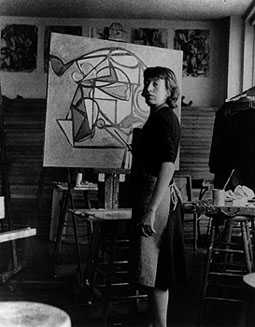 We get used to a certain kind of color of form or format, and it's acceptable. And to puncture that is sticking your neck out a bit. And then pretty soon, that's very acceptable. Lee Krasner
We get used to a certain kind of color of form or format, and it's acceptable. And to puncture that is sticking your neck out a bit. And then pretty soon, that's very acceptable. Lee KrasnerI have oftened wondered if Lee Krasner put her painting on hold to support her husband Jackson Pollack.
How could you ever get out of that shadow?
Krasner was born as Lena Krassner (outside the family she was known as Lenore Krasner) in Brooklyn, New York to Russian Jewish immigrant parents from Bessarabia. [2] [3]
She studied at The Cooper Union and the National Academy of Design, and worked on the WPA Federal Art Project from 1935 to 1943. Starting in 1937, she took classes with Hans Hofmann, who taught the principles of cubism, and his influence helped to direct Krasner's work toward neo-cubist abstraction. When commenting on her work, Hofmann stated, "This is so good you would not know it was painted by a woman."[4] (wikipedia)
Fro the following website:
http://sb.cc.stonybrook.edu/pkhouse/story/krasner2.shtml
During their early years together, Krasner underwent a profound reappraisal of her artistic direction; she struggled, in her words, to "lose Cubism" and "absorb Pollock." Nevertheless, although she acknowledged Pollock's superior gifts, she did not become his follower. More than three years his senior, she was a mature artist when they met and throughout her aesthetic evolution retained elements of her early analytical skills and structural sophistication. Moreover, she never lost her deep admiration for Matisse, an artist who interested Pollock only marginally, and for Mondrian, whose grid remained as an underpinning for many of her all-over compositions, notably her "Little Image" series and rectangle abstractions of 1946-51. Matisse in particular was a life-long source of inspiration for her. Yet the intuitive nature of Pollock's approach helped free Krasner's art from formalist strictures, while her discerning eye and keen judgement--as well as her single-minded dedication to promoting his career--proved invaluable to his success.

No comments:
Post a Comment